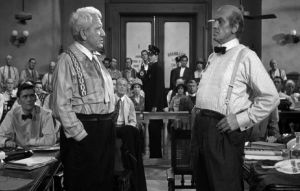Mary Cipperman ‘21, Michael Bai ‘20: On November 2-4, 2017, the Upper School Theater Department at the Episcopal Academy will perform Inherit the Wind. Jerome Lawrence and Robert E. Lee’s 1955 play tells a fictionalized version of the 1925 Scopes Trial and the ensuing debate between creationism and evolutionism. Inherit the Wind criticizes the political and social tensions of the Red Scare Era, which are not unlike today’s politically charged environment.
One way in which the play reflects certain contemporary issues is through its characters’ viewpoints. The characters in Inherit the Wind cannot see the perspectives of their adversaries, and they sometimes represent two extremes of perspective. Daniel Clay, Theater Department Chair and teacher, says, “We have these two lawyers: one is arguing against a law that forbids the teaching of evolution in schools and trying to paint it out to be a bad law, and is a proponent of freedom of thought. The other is a fundamentalist who thinks the Bible is literal, so there is no room for the objective facts of science in his brain, and the two people clash. Both are good people, both are smart people, and these two characters are represented as the extremes of both sides.” Tom Greenwood, Middle School English Chair, states, “Various characters illustrate the qualities that contribute to a polarized, antagonistic society and also the qualities that could lead to a resolution of conflicts.” Sarah Letts ‘20, who acts as George Sillers in the play, says, “We are trying to emphasize that there are extremes in both parties, and we’re trying to relate that to today.” Even though there are characters in direct conflict with each other, there are some who are able to accept contrasting views. As Greenwood explains, “It is Rachel, however, who is the focus of the play as she learns to accept the responsibility of having to draw her own conclusions after learning the arguments …Rachel especially shows how vital it is for us to have the courage to think and then form our own opinions.”

Public broadcasting in Inherit the Wind contributes to political polarization. Greenwood says, “The media references in the play are very relevant. . . It was the first trial broadcast nationally on radio. . . I’m sure Fox News and CNN wish they had been around for it.” Clay comments, “I think people are psychologically predisposed to seeking out information that confirms our beliefs, and I think that is sort of what has gotten us into trouble as a society.” They agree that the media, as portrayed in Inherit the Wind, contributes to political divisions that continue today.
The play features the courtroom battles of science versus religion, evolutionism versus creationism, and free thought versus fundamentalism. Greenwood notes, “The authors chose the Scopes trial as a vehicle for their concerns about the Red Scare era of the ‘50s . . . The play describes what happens when society is polarized, which clearly describes the current scene.” According to Greenwood, as Drummond and Brady vie for a victory, they simultaneously spar for science or religion throughout any time period. Mireya Yaros, US Spanish Teacher, comments, “Because the Bible doesn’t talk about climate change, some people deny it. We’re just going back to the period of no regulations, then we made progress and created regulations that they now want to undo. It’s depressing that it’s still an issue today.” However, others at Episcopal Academy remark that the play does not represent a division at all. Phoebe Barr ‘19, who plays Mrs. Goodfellow, says, “I think the Inherit the Wind story is ultimately a debate not between science and religion per se, but between people who want to believe something because it makes them feel good and people who want to believe something because it is scientifically factual.” She continues, “…And that’s certainly applicable in today’s world, in which a lot of rhetoric is focused around the way that certain policies and certain facts make people feel. It’s really important to remember how important . . . facts, and evidence really are.” Clay says, “Inherit the Wind was a great choice because even though it’s about something that happened in 1925, the Scopes Trial, in a more broad sense, it’s about the freedom to think and the ability to listen to someone else’s opinion. People think religion is pitted up against science, but it’s not really that. It’s really about people being allowed to think, to hold opinions, and to respect one another’s opinions about things and beliefs.” Emma Humann ‘19, Mrs. Blair in the play, says, “I think a really important theme of Inherit the Wind is that you can take two extremes and put them together . . .you don’t have to have just one or the other. You can have science and religion.” Since the play supports open dialogue, Nishant Thangada ‘19 says, “. . .the play shouldn’t affect or offend anyone. It’s just like a continuation of chapel.”